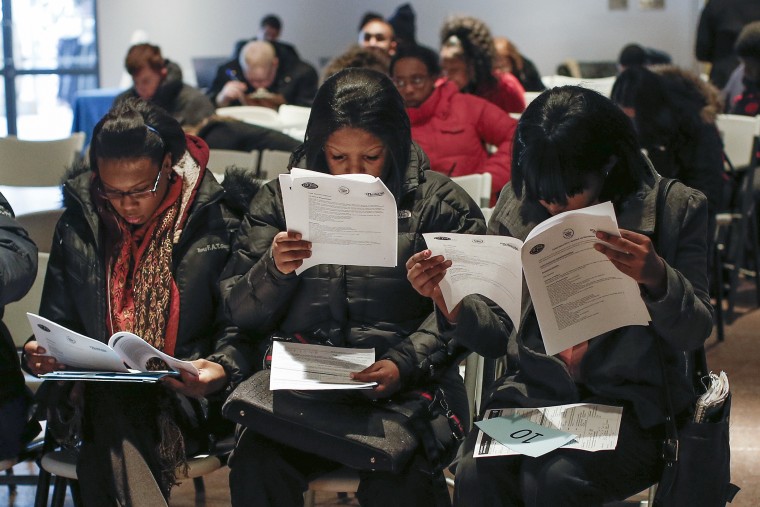The window of opportunity for reviving jobless benefits is closing fast.
Democrats have now struggled for months to renew the federal benefits for the long-term unemployed as Republicans have blocked one bill after another. Now Hill staffers and advocates for more jobless aid say that time is almost up: The last politically feasible opportunity for Congress to act is coming at the end of March.
That's when Congress must take up what's known as the "doc fix"—a fix to a flawed payment formula for Medicare providers that both Democrats and Republicans always find a way to address. It's the last major fiscal decision that Congress is guaranteed to make for months, and Democrats are hoping to work unemployment benefits into the same discussions over what to do when the Medicare payment fix expires on March 31.
The doc fix "is the last train leaving the station," says one source close to the negotiations. Democrats could continue to pass stand-alone bills to renew unemployment aid later in the year. But they've gone nowhere with the approach so far as Republicans have blocked every bill to extend them, despite the various offsets that have been offered. What's more, the political urgency for restoring the federal benefits is likely to diminish the more time passes. Already, it's been more than two months since the Dec. 28 expiration of the federal benefits, which kick in after state aid expires—typically after 26 weeks of unemployment.
So Democrats are hoping that unemployment aid can hitch a ride on a piece of legislation that both parties agree must pass. They certainly need the help: Talks between Senate Democrats and a small handful of Republicans have continued, though they still haven't borne new fruit. "We understand that there are very serious negotiations in the Senate involving the usual suspects – we’re hopeful there will be a breakthrough," says Judy Conti, federal advocacy coordinator for the National Employment Law Project.
Democrats are trying to use a procedural tactic known as a discharge petition to force a vote on unemployment benefits in the House. But the procedure has rarely worked in the past, and even Republicans who've asked Speaker John Boehner to extend unemployment aid aren't lining up behind the move in the House. "The congressman supports extending unemployment benefits and is awaiting Senate action," says Jason Galanes, a spokesman for Rep. Frank LoBiondo, a New Jersey Republican.
There's no guarantee that the doc fix debate will give Democrats any more leverage on the unemployment issue, however. Neither lawmakers nor Medicare doctors like having to fix the flawed formula year after year, but a permanent fix carries a $138 billion price tag, and none have surfaced yet. And apolitically acceptable offsets that emerge could end up going to the doc fix instead of the more controversial unemployment benefits.
Congress could also just pass yet another short-term doc fix without extending unemployment aid, like the three-month extension it passed in December. Democrats may argue that Medicare doctors shouldn't be more of a priority than the long-term unemployed. Congress has proven more than willing to act along those lines.
